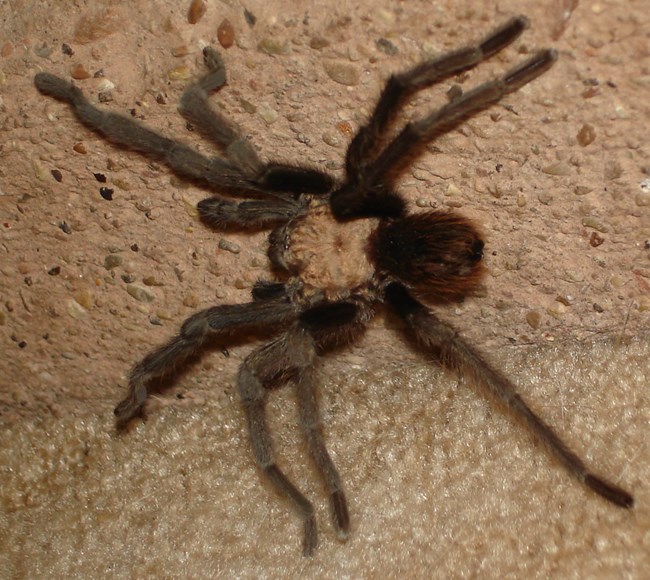
NPS/ADRIENNE FITZGERALD Tarantulas – Big & Hairy, but not so Scary Tarantulas are the largest spiders in the southwest, and one of Zion’s most misunderstood inhabitants. Despite their portrayal in horror movies as deadly, poisonous, and aggressive, tarantulas are actually docile and interesting creatures. Although tarantulas are capable of biting a person if harassed, bites are very rare and their venom is considered non-toxic to humans. And like most wildlife, they won’t bother you if you don’t bother them. Tarantulas are rarely seen in Zion—they are nocturnal and spend most of their time in underground burrows--but sightings are most common on park roads in late summer and fall, when the males are out cruising for females. The females are basically homebodies who don’t travel far from their individual burrows during their lifespan of up to 25 years. Males may live up to 10 years—and are the tarantulas most frequently seen—during their perilous journey in search of a mate. Many are run over on roads, or eaten by predators en route. For those lucky enough to find a receptive female, some are eaten by the female after mating, and if not, will die soon anyway. Foxes, pallid bats, roadrunners, and other desert omnivores may include a tarantula on their dinner menu. Tarantulas are also hunted in their own homes by a parasitic wasp known as the Tarantula Hawk. The main defense a tarantula has against predators is to use its back legs to fling hairs from its belly at the attacker. The hairs are finely barbed(urticating hairs), and can cause severe irritation to the face of a curious coyote. Tarantulas are nocturnal hunters, and items on the menu are primarily insects—grasshoppers, beetles, or even other spiders. Tarantulas use their fangs to inject venom which subdues and helps to digest their prey. One cricket can tide a tarantula over for a few weeks – a good thing in the desert, where food may be scarce. Also, like many desert animals, spending time underground allows them to survive the heat of a desert summer and the cold of winter. While in Zion, be sure to follow posted speed limits and drive carefully to avoid hitting tarantulas and other park wildlife. If you do see a tarantula during your park visit, consider yourself lucky! |
An official website of the United States government
Here's how you know
Official websites use .gov
A
.gov website belongs to an official government
organization in the United States.
Secure .gov websites use HTTPS
A
lock (
) or https:// means you've safely connected to
the .gov website. Share sensitive information only on official,
secure websites.
